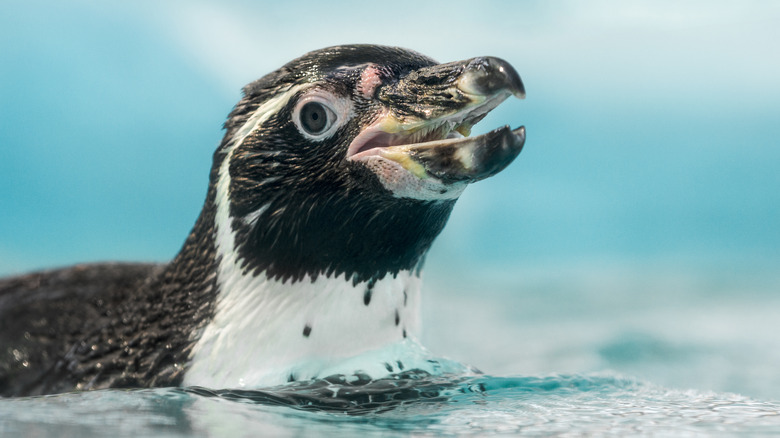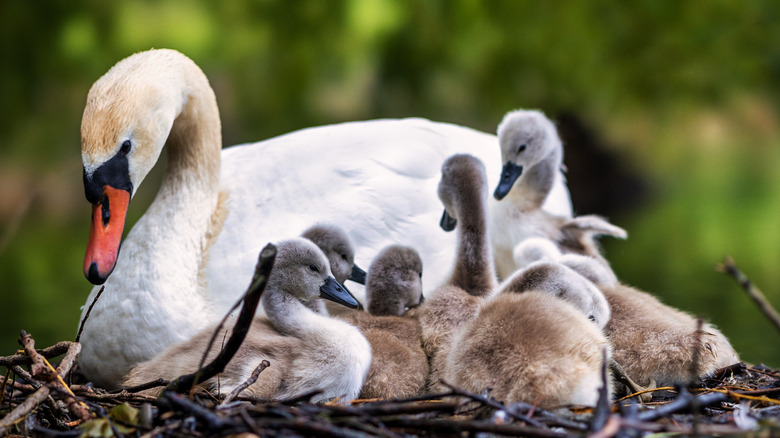The Best Theories On Why Birds Don't Have Teeth
On the surface, it sounds like a dumb question: Why don't birds have teeth? Well, because they have beaks, silly. It's like asking why dogs don't have wings or horses don't have flippers. According to scientific consensus, though, birds did indeed used to have teeth, but around 116 million years ago a mutation led to the inhibition of the gene that produced them, leading to the emergence of toothless, beaked birds. But there's a little more to the question than first appears.
Here's one cool fact about birds you probably already know: They descended from dinosaurs. That's right, even the humble chicken had as its ancestor the mighty Tyrannosaurus rex. You might also have seen some of those CGI images of mid-evolution dinosaurs with feathers (that look a little gross, to be honest). Heck, there is a school of thought that says many dinosaurs were feathered right from the beginning, but that's beside the point. The point is: dinosaurs had teeth, sometimes big scary ones, and they evolved into birds as we know them today. Yet while scientists have been able to pinpoint roughly when birds first lost their teeth, the question remains as to why birds without teeth evolved in the first place. Well, there are a few theories.
Teeth would inhibit flight
The beaks of birds can be thought of as cunningly designed eating utensils, perfectly adapted for each species' need for food. Birds use their beaks like chopsticks to seize edible objects or to peck into holes to gain access to vital food sources like grubs and worms. But would they not also benefit from the presence of teeth?
Not according to one theory put forward by academics Zhonghe Zhou and Fucheng Zhang Zhiheng Li in their paper, "A new Lower Cretaceous bird from China and tooth reduction in early avian evolution," published in Proceedings of the Royal Society B in 2009.They suggest that the lack of teeth among certain birds gave the creatures — which have lightweight bones — an added weight advantage during flight. This explains their dominance over toothed avians in the period following the initial mutation.
It sounds like a fine theory, and for many years the scientific community took these findings as a reasonable explanation for the absence of teeth among birds. However, another convincing theory emerged more recently that experts say might be the true reason birds no longer have teeth.
No teeth means faster incubation
If you've ever held a bird, you may have noticed how light they are for their size and possibly guessed that their lack of weight assists them in taking to the air. With this in mind, you could reasonably deduce that teeth would weigh a bird down, inhibiting its flight abilities, and that's the reason why they don't have them.
But this next theory — which has garnered a lot of scientific support — really does take some specialist scientific knowledge to piece together. It has to do with the development of chicks in the egg and was explored in an article titled "Dinosaur incubation periods directly determined from growth-line counts in embryonic teeth show reptilian-grade development," published in PNAS in 2017. Scientists led by Gregory M. Erickson outlined how tooth formation in the egg meant that pre-avian creatures like dinosaurs had incubation periods that lasted far longer than those of modern birds, which typically hatch within the space of a few weeks or months. Even with a parent's protection, eggs are vulnerable to predators, meaning that by not having teeth — which are the last part of an embryo to develop in an egg — modern birds have greatly increased their likelihood of making it through their incubation period.
So what sounded like a silly question at first has certainly given us something to chew over.


